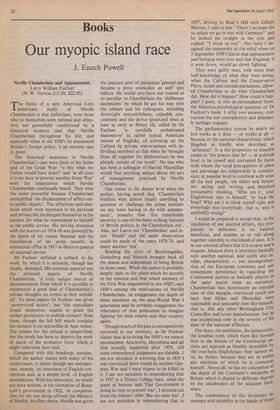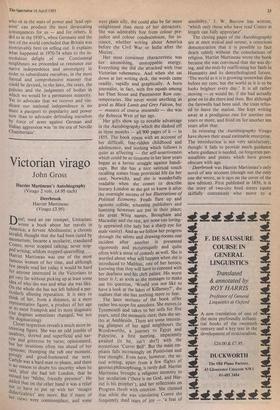Books
Our myopic island race
J. Enoch Powell
Neville Chamberlain and Appeasement. Larry William Fuchser (W.W. Norton £13.50, $22.95)
rr he thesis of a new American (very I American) study of Neville Chamberlain is that politicians, even those who to themselves seem rational and objec- tive, are powerfully conditioned by a historical memory and that Neville Chamberlain throughout his life, and especially when in the 1930's he dominated Britain's foreign policy, is an extreme case in point.
The historical memories in Neville Chamberlain's case were those of his father and of the Great War: 'is this what my Father would have done?' and 'at all costs it is my duty to prevent another Great War' were the imperatives which Neville Chamberlain continually heard. They were the more powerful because Chamberlain exemplified 'the displacement of affects on- to public objects'. The affections arid emo- tions which were repressed in his personal and private life discharged themselves in the passion for what he represented to himself as the public service. His driving obsession with the horrors of 1914-18 was powered by the death of his cousin Norman and the humiliation of his seven months in ministerial office in 1917 as director-general of national service.
Dr Fuchser suffered a setback in his work, by which it is seriously, though not fatally, damaged. His essential material was the personal papers of Neville Chamberlain, 'a truly unique source of documentation from which it is possible to reconstruct a great deal of Chamberlain's private thoughts on events as they unfold- ed'. To these papers Dr Fuchser was given `unrestricted access'; but 'the custodians found themselves unable to grant the author permission to publish extracts' from them, though the full MS which contains the extracts is on microfilm at Ann Arbor. The reason for the refusal is unspecified; but the result has been to deprive the work of much of the probative force which it might otherwise have had.
Compared with this handicap, another, which the author shares with many of his countrymen, is minor though not unimpor- tant, namely, an innocence of English con- ventions and, at a deeper level, of English assumptions. With less innocence, he would not have written, at the formation of Bonar Law's government in 1922, 'in compensa- tion for his not being offered the Ministry of Health, his first choice, Neville was given the sinecure post of paymaster-general and became a privy councillor as weir (my italics). He would also have not treated as so peculiar to Chamberlain the 'deliberate deceptions' by which he got his way with the cabinet and his colleagues, including downright untruthfulness, culpable con- cealment and the device (practised since at least as early as Henry II), called by Dr Fuchser 'a carefully orchestrated manoeuvre' (a rather typical American misuse of English), of softening up the Cabinet by private conversations with in- dividual members so that when he 'brought them all together for deliberations he was already certain of the result'. No one who has been a colleague of Harold Macmillan would find anything unique about the arts of management practised by Neville Chamberlain.
One comes to the deeper level when the author, having noted that 'Chamberlain loyalists were almost totally unwilling to question or challenge the prime minister on any issue having to do with appease- ment', remarks that 'this remarkable passivity is one of the most striking features of British politics in the Chamberlain era'. Alas, no! Leave out 'Chamberlain' and in- sert 'Heath' and the same observation could be made of the years 1970-74, and many another 'era'.
Reading the story of Berchtesgaden, Godesberg and Munich brought back all the shame and indignation of being British in those years. While the author is probably largely right in the place which he accords to the remorse and fear which memory of the First War engendered in the 1920's and 1930's among the motivations of Neville Chamberlain, he exaggerates the depth of these emotions on the post-World War I generation and he certainly exaggerates the reluctance of that generation to imagine fighting for their empire and their country again.
Though much of the past is retrospectively corrected in our memory, as Dr Fuchser claims that in re-living the 1930's we cannot unremember Auschwitz, Hiroshima and all that actually happened after 1939, still some remembered judgments are datable. I am not mistaken in knowing that in 1935 1 was convinced there would be another Ger- man War and I must expect to be killed in it. I am not mistaken in remembering that in 1937 at a Trinity College feast, when the guest of honour said 'Our Government is doing its best to prevent war', I shouted out from the fellows' table 'But we want war'. I am not mistaken in remembering that in
1937, driving to Boar's Hill with Gilbert Murray, I said to him "There's no hope for us unless we go to war with Germany" and he looked me straight in the eyes and replied "I think so too". Nor have I im- agined the immensity of the relief when on 3 September 1939 I learnt that appeasement and betrayal were over and that England, if it went down, would go down fighting.
They were guilty men, with more than half-knowledge of what they were doing, when the Cabinet and the Conservative Party, inside and outside parliament, allow- ed Chamberlain to do what Chamberlain did. How did it happen? How could it hap- pen? I pose, in this de-personalized form, the historico-psychological question of Dr Fuchser's book. I offer two answers, con- current but not contradictory and ultimate- ly perhaps cognate.
The parliamentary system by which we live works as it does — or works at all — because of the national characteristic which Bagehot in kindly wise described as `deferende'. It is the propensity to knuckle under to 'the powers that be' — at political level to be cowed and corrupted by those with whom the royal prerogatives of place and patronage are temporarily in commis- sion; at popular level to conform with what all the best people, the elders and betters are saying and writing and therefore presumably thinking. 'Who am I', your Englishman says to himself, `to rock the boat? Who am I to think myself right and everybody else (everybody, that is, who is anybody) wrong?'
I would be prepared to accept that, in the regulation of our internal affairs, this pro- pensity to deference is on balance beneficial, and enables us to rub along together tolerably in this island of ours. It is in our external affairs that it is a curse and a disaster, because there it intersects fatefully with another national, and surely also in- sular, characteristic — our incomprehen- sion of the European continent and our consequent persistence, in regarding the Continental nations as basically players in the same soccer team as ourselves. Chamberlain was notoriously an extrerne case of this myopia, convinced (until too late) that Hitler and Mussolini were reasonable and peaceable men like himself, that is, like any other Birmingham City Councillor and screw manufacturer, but he was exceptional only in the severity of his dose of the national affliction.
The fears, the ambitions, the animosities, the loyalties even, which burn like furnace fires in the bosom of the Continental na' tions are rejected as blankly incredible bY the true-born Englishman: they cannot ex- ist, he thinks, because they are so unlike any emotions of which he is conscious himself. Above all, he has no conception of the depth of the Continent's antipathy t° Britain which is shared to different degrees by the inhabitants of the adjacent land- mass.
The combination of this inveterate in- nocence with pliability at the hands of those
who sit in the seats of power and 'lead opi- nion' can produce the most devastating consequences for us — and for others. It ,did so in the 1930's, when Germany and the rest of the world concluded that Britain was irretrievably bent on selling out. It explains what happened in 1970-74 when to the in- credulous delight of our Continental neighbours we proceeded to renounce our native independence and sovereignty in Order to subordinate ourselves, in the most formal and comprehensive manner that could be devised, to the laws, the taxes, the Policies and the judgments of bodies in Which we would be a permanent minority. Yet to advocate that we recover and vin- dicate our national independence is no more a passport to popularity and power now than to advocate defending ourselves by force of arms against German and Italian aggression was 'in the era of Neville Chamberlain'











































 Previous page
Previous page